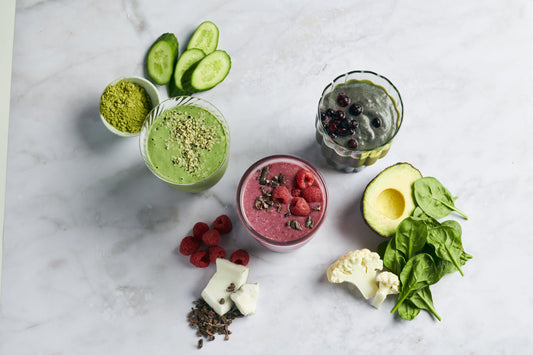
How Mindfulness Can Help Our Gut Health
By Ashley Stanek, Wellness Coach at Clean

What is Mindfulness?
Mindfulness is a keen awareness of an individual’s emotions and body without judgment. The umbrella term of mindfulness contains various branches, such as meditation, stress reduction techniques, and mindful eating, all contributing to this awareness of one’s experience [2]. Meditation is the practice of paying attention to the fluctuations of the mind and bodily sensations. Although it has gained recent popularity in the wellness world, meditation has been around for quite some time, originating in India as long ago as 1500 BCE. The word meditation stems from meditatum, a Latin term that means ‘to ponder.’ Meditation can be done in a comfortable seated position in a chair, on the floor, lying down, or in any other place that allows stillness and physical comfort.
It is often perceived that the goal of meditation is to think about nothing, which most people find extremely difficult in today’s busy world. This is not the goal of meditation, and there is nothing wrong with you if this complete stillness of the mind seems unattainable. From an evolutionary standpoint, it is the brain’s job to continue always thinking to keep us safe from potential harm.
Entering meditation without expectation or a goal in mind can be helpful, as each day and each meditation experience can be vastly different. Instead of seeking to think about nothing, simply noticing the thoughts and emotions that are present, as well as bodily sensations, can guide meditators to feel more connected to their mind, body, and spirit. Meditation can help slow the rate of thinking to the point of near stillness, allowing a decrease in nervous system activation and feelings of calm and ease.
You might think, “Why should I meditate or incorporate mindfulness?”
Recent research suggests that meditation may impact the makeup of gut microbiota, in turn impacting digestion. Our gut and brain are in constant communication via the gut-brain axis, the vagus nerve acting as the highway between these two epicenters of the body.
Mindfulness & Digestion
A hypothesized construct called the stress-digestion-mindfulness triad suggests that mind-body practices such as meditation may help to cultivate homeostasis in the autonomic nervous system (rest and digest), which is crucial for optimal digestive function [2]. Research supports the thought that mindfulness-based techniques such as meditation may be effective interventions in many chronic health conditions, especially gastrointestinal disorders.
Additionally, prolonged stress can influence the physiological functioning of our body’s cells, which can induce chronic inflammation. This inflammation can ultimately alter the gut microbiome and significantly impact the gut-brain axis [1].

Reducing stress in our busy everyday lives is crucial to maintaining optimal gut health and inflammation levels. Meditating, even 5 minutes a day, can significantly impact stress levels long term. If you're not keen on meditating, mindfulness practices while you eat, drive, and go about everyday tasks can also go a long way in helping the nervous system to remain balanced. Incorporating mindfulness into daily tasks may help to reduce one’s overall level of stress, enhancing overall digestive function.
What to do?
Mindfulness can be incorporated into all aspects of life, from mindful eating to driving mindfully in traffic. Here are some actionable steps to try out to get you started:
1) Start your day with stillness. This can help to ensure that your day starts with a calm nervous system, supporting your rest and digest state [2].
2) Eliminate distractions and complete the task at hand. If you’re eating, eat. If you’re driving, drive. Notice all the little details of what you are doing without the distraction of stacking another task on top.
3) Engage your senses. Taste your food! Chew it completely. Smell, see and touch your food [2].
4) Eat slowly. Slowing the eating process can help break your food into more bioavailable components, triggering necessary enzymes and internal signals to prepare for digestion [2].
References:
[1] https://www.worldscientific.com/doi/abs/10.1142/9789811221156_0013
[2] https://www.ncbi.nlm.nih.gov/pmc/articles/PMC7219460/






